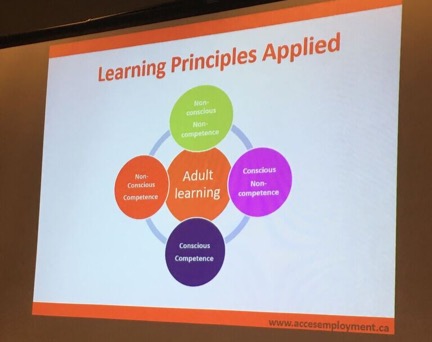New online programs are looking at how work is done in other parts of the world in order to more easily transfer newcomers’ skills to the Canadian job market.
Abigail Fulton presented the British Columbia Construction Association’s (BCCA) Integrating Newcomers program on Mar. 4 at the 18th National Metropolis Conference in Toronto.
The program was one of two B.C.-based collaborative business plans showcased in the panel discussion “Facilitating Labour Market Integration to Skilled Trades”. The programs cater specifically to the construction market and offer an innovative way to reach immigrants who practise labour work in their home countries.
“Many construction companies tend to look within their circles for hiring,” explained Fulton. “They employ their friends and family. Because of this, those who don’t fit into that category have a harder time finding work.”
She explained that the integration program helps fill a gap, as 85 per cent of construction companies in B.C. have less than 10 employees.
… [U]nderstanding how construction is done in other countries [is] research Fulton calls “invaluable.”
An important aspect of the program is understanding how construction is done in other countries – research Fulton calls “invaluable.”
Addressing competency gaps
The BCCA Integrating Newcomers program focuses on assessing the skills of potential immigrants overseas as well as providing information about working and living in B.C., and later, employment leads.
It is an example of several pre-arrival tactics that use online programs to properly survey, assess, mentor and inform newcomers about Canada’s workforce and labour market.
Alongside this research is preparation for newcomers who want to settle in Canada and partake in the labour workforce. This is where the second business module called Facilitating Access to Skill Trades (FAST) comes into play.
“Someone that comes from another country may have the components of many things, but we want to train them on the parts they don’t know.”
Sangeeta Subramanian of the Immigrant Employment Council of BC (IEC of BC) and Lawrence Parisotto of British Columbia Institute of Technology (BCIT) presented FAST as a competency assessment and gap training tool for skill trades individuals.
Parisotto says the program is “explicit and direct.”
“Someone that comes from another country may have the components of many things, but we want to train them on the parts they don’t know,” said Parisotto. “The way to do that is being contextual and dependent between our content so that it provides and addresses outcomes.”
Getting credentials recognized in advance
FAST’s online application is collaborated with Shift IQ, a cloud-based learning management company.
Shift IQ provides detailed diagnostics, validation, gap identification, post assessments and contributes to the e-mentoring program that guides and coaches a person through understanding the trades and services.
The research BCCA Integrating Newcomers and FAST partake in both concluded that one of the main things immigrants should complete pre-arrival is getting their credentials recognized.
Similar advice was mentioned in the “Seamless Service from Pre- to Post-Arrival in Canada” workshop.
Maha Surani, a senior program officer and stakeholder at the Canadian Immigrant Integration Program (CIIP) said that research done by Planning for Canada to align newcomers with sector specific jobs showed that 63 per cent of employers encouraged pre-arrival immigrants to have their credentials assessed.
Surani spoke on Planning for Canada’s collaboration with Acces Employment, a company connecting employers with qualified employees from diverse backgrounds.
“There’s nothing generic about our work, which enhances the program altogether,” said Sue Sadler, a senior director of services and program development at Acces.
“We have sector-specific training, and then follow through with a job search,” explained Sadler. “We then have business communications with our clients, the employers. All of this is done to connect our pre-arrival candidates to employers.”
[I]t is also essential for employers and staff members within various companies to understand the importance of inclusion of various backgrounds and diversity.

Connecting with employers
Acces Employment’s continuum module is enabled by online technology to enhance the job search of immigrants early on. The eight-week program caters to six sector-specific markets – engineering, human resources, finance, sales and marketing, supply chain and information technology.
Markus Van Aardt, the business communications consultant behind the program, said that “folks are hungry for this information.”
He explained the learning principle of the program: Immigrants usually start off being non-conscious and non-competent of the skills required for each of their desired job sectors.
“I’ve walked in these folks’ shoes, it’s important to make sure they are in good hands,” said Van Aardt adamantly.
“Newcomers want this information. They will drive you, and you don’t have to drive them. They will move quickly in the learning process, from being non-conscious, non-competence to conscious, [competence],” he said, using a diagram outlining the process of adult learning to illustrate his point.
Enid Pico, senior vice-president and head of operations and share services at Scotiabank, spoke from an employer’s perspective.
As the first female president of Scotiabank Puerto Rico and once a newcomer to Canada, she shared her encounters as a newcomer to the country and stated that while a pre-arrival program that prepares immigrants for job specific sectors is important, it is also essential for employers and staff members within various companies to understand the importance of inclusion of various backgrounds and diversity.
“These cross-competency relationships are important. [Scotiabank] believes in diversity. It’s the right and smart thing to do,” said Pico. “Because of this, it’s important for us to find units and partners [like Planning for Canada and Acces] so that we can work with them to give us what we need.”
Acces Employment and FAST’s pre-arrival modules will launch later on this year and the BCCA’s Integrating Newcomers program is now accepting applications.





